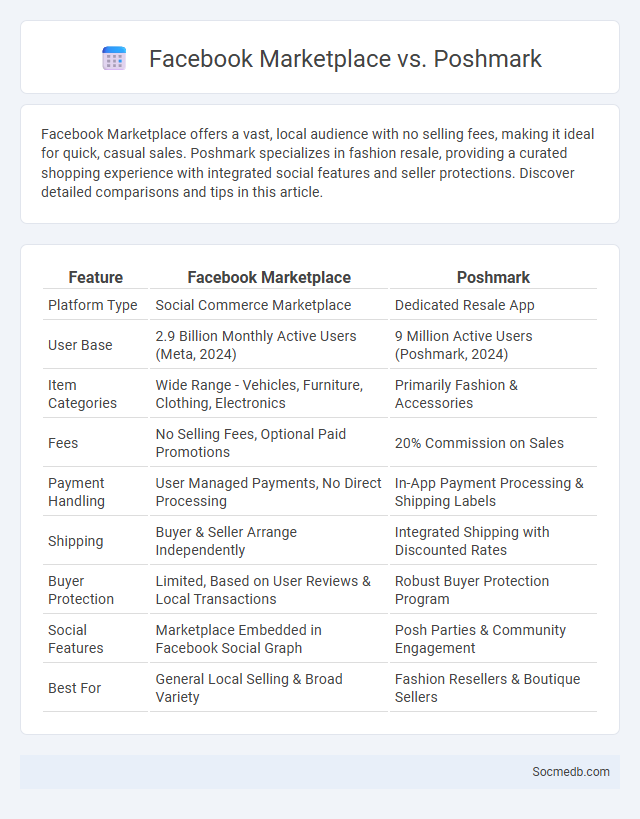
Photo illustration: Facebook Marketplace vs Poshmark
Facebook Marketplace offers a vast, local audience with no selling fees, making it ideal for quick, casual sales. Poshmark specializes in fashion resale, providing a curated shopping experience with integrated social features and seller protections. Discover detailed comparisons and tips in this article.
Table of Comparison
| Feature | Facebook Marketplace | Poshmark |
|---|---|---|
| Platform Type | Social Commerce Marketplace | Dedicated Resale App |
| User Base | 2.9 Billion Monthly Active Users (Meta, 2024) | 9 Million Active Users (Poshmark, 2024) |
| Item Categories | Wide Range - Vehicles, Furniture, Clothing, Electronics | Primarily Fashion & Accessories |
| Fees | No Selling Fees, Optional Paid Promotions | 20% Commission on Sales |
| Payment Handling | User Managed Payments, No Direct Processing | In-App Payment Processing & Shipping Labels |
| Shipping | Buyer & Seller Arrange Independently | Integrated Shipping with Discounted Rates |
| Buyer Protection | Limited, Based on User Reviews & Local Transactions | Robust Buyer Protection Program |
| Social Features | Marketplace Embedded in Facebook Social Graph | Posh Parties & Community Engagement |
| Best For | General Local Selling & Broad Variety | Fashion Resellers & Boutique Sellers |
Introduction to Online Marketplaces
Online marketplaces serve as digital platforms where buyers and sellers connect to exchange goods and services efficiently. These marketplaces leverage advanced algorithms and user data to personalize shopping experiences, boosting customer engagement and sales conversion rates. Their growth is propelled by increasing smartphone usage and the rise of e-commerce, making them pivotal in the digital economy.
What is Facebook Marketplace?
Facebook Marketplace is a digital platform integrated within Facebook that allows users to buy, sell, and trade items locally or nationally. It features categories ranging from electronics and clothing to vehicles and real estate, leveraging Facebook's extensive user base to facilitate peer-to-peer transactions. The Marketplace utilizes user profiles and location data to provide personalized and relevant listings, enhancing trust and convenience in online commerce.
Overview of Poshmark Platform
Poshmark is a leading social commerce platform specializing in buying and selling new and secondhand fashion items, including clothing, shoes, and accessories. It combines a user-friendly interface with social networking features like sharing closets, hosting virtual parties, and following sellers, enhancing community engagement and discovery. With millions of active users across the United States, Poshmark facilitates peer-to-peer transactions while offering seller tools such as pricing suggestions and shipping label integration.
Marketplace: General Features and Comparisons
Marketplace platforms on social media provide users with seamless buying and selling experiences, featuring robust search filters, secure payment options, and integrated messaging for direct communication. Compared to traditional e-commerce sites, social media marketplaces leverage user profiles and social connections to build trust and enhance personalized recommendations. Your success in these marketplaces depends on understanding platform-specific tools and optimizing listings for visibility and engagement.
User Demographics and Community
User demographics on social media platforms indicate a diverse range of ages, interests, and geographic locations, with younger users dominating platforms like TikTok and Instagram, while older demographics prefer Facebook and LinkedIn. Communities on these platforms form around shared interests, values, and goals, fostering engagement through interactive content and support networks. Understanding your specific audience's demographics and community behavior can enhance targeted marketing strategies and improve overall user engagement.
Selling Process: Steps and Ease of Use
The selling process on social media involves listing products, engaging with potential buyers, and finalizing transactions through secure payment methods. Platforms like Facebook Marketplace, Instagram Shops, and TikTok Shopping offer user-friendly interfaces that simplify each step, allowing you to manage sales efficiently from a single app. Streamlined features such as chat support, inventory management, and integrated checkout enhance ease of use, making social media an effective channel for growing your business.
Fees and Revenue Models
Social media platforms primarily generate revenue through advertising fees, where businesses pay for targeted ad placements based on user demographics and behavior data. Subscription models, including premium memberships with exclusive features or ad-free experiences, offer alternative income streams. Influencer partnerships and sponsored content further diversify revenue by connecting brands with engaged audiences.
Buyer Protection and Security Measures
Buyer protection on social media platforms is strengthened by advanced encryption technologies and secure payment gateways, ensuring your transactions remain confidential and safe from fraud. Social media companies implement robust fraud detection algorithms and two-factor authentication to safeguard user accounts and personal information. Prioritizing your security, these measures reduce risks associated with online scams and unauthorized purchases, enhancing trust in social commerce transactions.
Shipping, Returns, and Customer Support
Shipping policies on social media platforms often emphasize fast, reliable delivery options with real-time tracking to enhance Your shopping experience. Clear returns procedures and easy-to-access customer support through direct messaging or chatbots ensure seamless issue resolution and boost customer satisfaction. Efficient communication channels on social media provide instant responses, empowering You to manage orders and resolve problems quickly.
Which Platform Is Best for Sellers and Buyers?
Facebook Marketplace offers a vast user base and local transaction capabilities, making it ideal for sellers targeting community buyers and for buyers seeking nearby deals. eBay stands out for sellers aiming to reach a global audience with auction-style listings, while buyers benefit from buyer protection and competitive pricing. Your choice depends on whether you prioritize local convenience with Facebook or broader reach and buyer safeguards on eBay.
 socmedb.com
socmedb.com